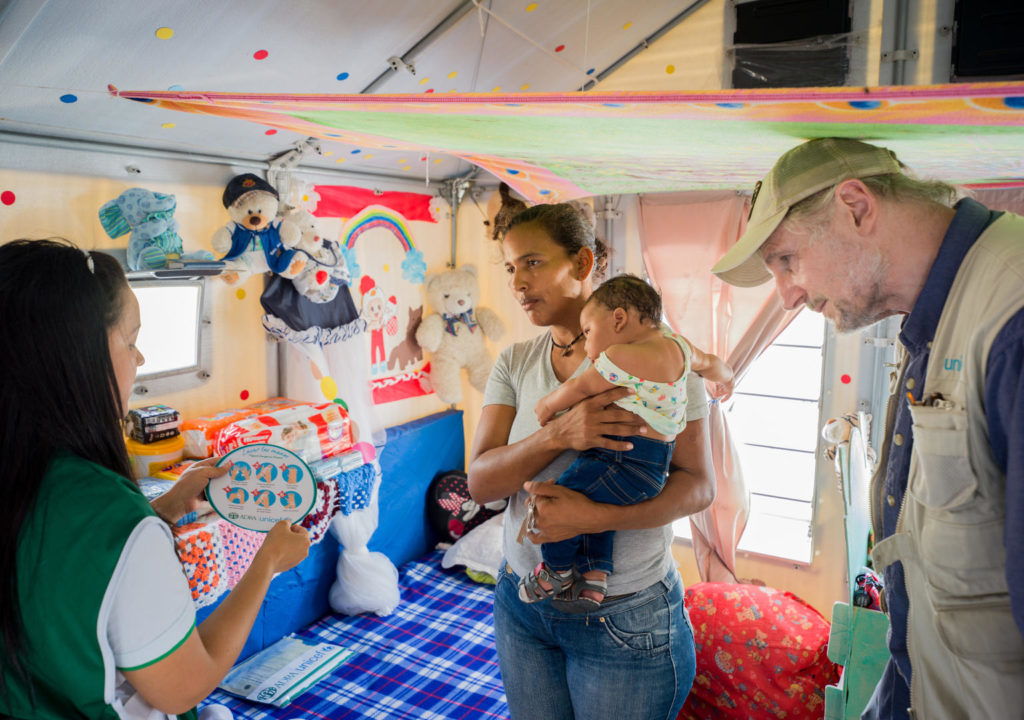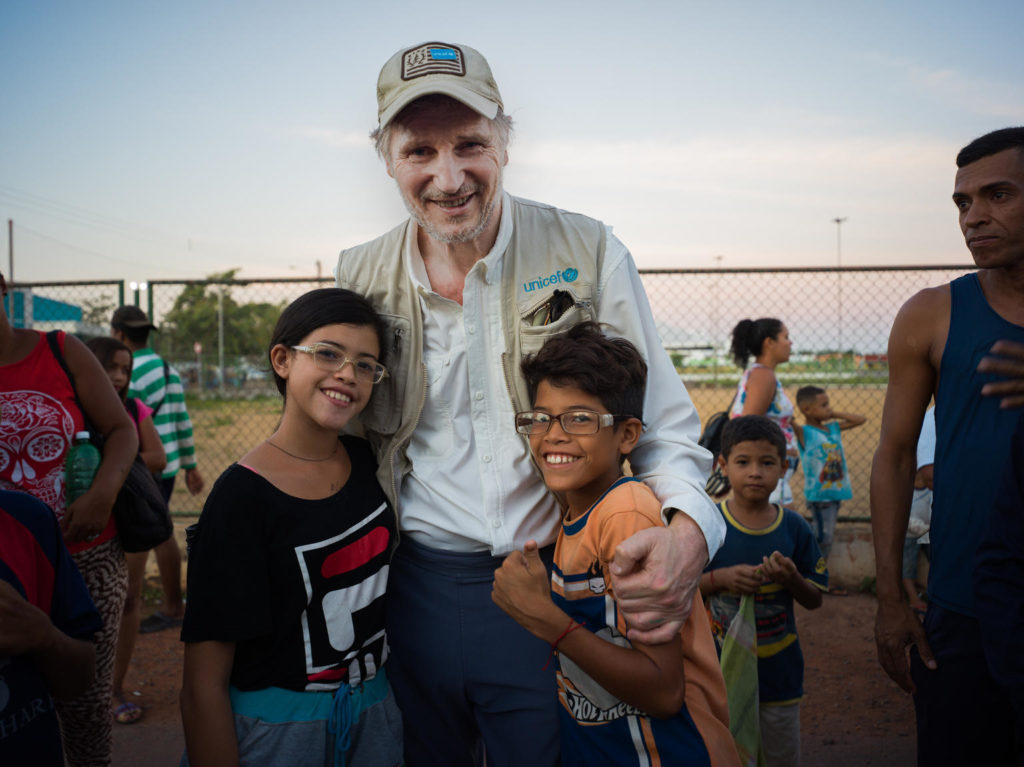LIAM NEESON took time out of his busy schedule to join UNICEF on a four-day visit to the Brazilian border with Venezuela where he met with vulnerable Venezuelan children and families, as well as those from host communities.
The Irish actor and UNICEF Goodwill Ambassador is among those urging the international community to do more to support refugee and migrant children from the South American region.
It is estimated that countries in Latin America and the Caribbean are already hosting about 3.9 million Venezuelan migrants and refugees in one of the world’s largest migration flows.
The number of families leaving Venezuela continues to rise with over 1.9 million children, including both Venezuelan migrants and those from host communities, expected to need assistance in 2020.
“I have spoken with Venezuelan families who crossed the border, many of them with children and babies,” said Neeson.
“They are exhausted, vulnerable, and still in shock as they left everything behind them. As a father, my heart broke when I heard their stories.
“But I also saw hope in the eyes of refugee children who seized every opportunity to learn in a safe environment, grow healthy and eventually, rebuild their lives in Brazil.”
 On 8 January 2020, UNICEF Goodwill Ambassador Liam Neeson and Venezuelan migrant Jenny Perez listen to a presentation on hand-washing by a WASH monitor from the UNICEF partner organization ADRA. Jenny lives with her husband and their two-month-old son, Luiz Perez, at the Rondon 3 shelter in Boa Vista, Brazil. UNICEF and partners facilitate access to safe water, sanitation and hygiene at this shelter.
On 8 January 2020, UNICEF Goodwill Ambassador Liam Neeson and Venezuelan migrant Jenny Perez listen to a presentation on hand-washing by a WASH monitor from the UNICEF partner organization ADRA. Jenny lives with her husband and their two-month-old son, Luiz Perez, at the Rondon 3 shelter in Boa Vista, Brazil. UNICEF and partners facilitate access to safe water, sanitation and hygiene at this shelter.
The actor travelled to the border crossing in Pacaraima where upon arrival, Venezuelans receive information on asylum applications and residency permits, and where they are given vaccinations.
In Boa Vista, Neeson visited one of the largest shelters for Venezuelans in Brazil. More than 1,000 people, half of them children, are currently living at the site where UNICEF and its partners provide humanitarian assistance, including education, child protection services, health and nutrition, as well as water, hygiene and sanitation services.
The UNICEF Goodwill Ambassador participated in recreational and educational activities aimed at preparing children and adolescents for their integration into Brazilian schools.
Amidst growing xenophobia towards Venezuelan refugees, Liam Neeson also joined an out-of-school holiday bootcamp that brings together Venezuelan and Brazilian adolescents to facilitate mutual understanding and foster friendships through sport and cultural activities.
“During my visit to Brazil, I saw the power of young Venezuelans and Brazilians coming together, living together. It reminded me of my experience during the conflict in Northern Ireland when I witnessed Catholic and Protestant children who became friends and broke the barrier of fear and misunderstanding.
“These memories came to my mind when I was listening to Jesus and Emily. Their friendship is a sign of hope for the future of both Venezuelan refugees and the communities hosting,” said Neeson.
UNICEF teams on the ground in several countries affected by the migration flow are delivering humanitarian assistance in hot spots at the borders and along the transit routes.
Together with local authorities and United Nations agencies in Ecuador, Peru, Brazil, Colombia, Guyana and Trinidad and Tobago, UNICEF is also scaling up its development response in urban settings and fostering the integration of Venezuelan children in host communities.
 On 6 January 2020 in Brazil, UNICEF Goodwill Ambassador Liam Neeson speaks with Venezuelan children, Julio Cesar, 12, and Karla Alejandra, 13 in Boa Vista, Roraima.
On 6 January 2020 in Brazil, UNICEF Goodwill Ambassador Liam Neeson speaks with Venezuelan children, Julio Cesar, 12, and Karla Alejandra, 13 in Boa Vista, Roraima.Bernt Aasen, UNICEF Regional Director for Latin America and the Caribbean said: “One of the key measures to prevent the Venezuela migration crisis from escalating further is to invest in Venezuelan children and young people to unlock their potential.”
“Beyond lifesaving assistance, ensuring migrating children are integrated into the education, health and protection systems of the host countries is now critical. If given this opportunity, one day these children will be the ones to shape a more stable and prosperous region for all.”
As of December 2019, just 41% of the $ 69.5 million needed last year had been raised. In 2020 UNICEF is seeking $64 million to meet the needs of about 633,000 children affected by migration from Venezuela.

